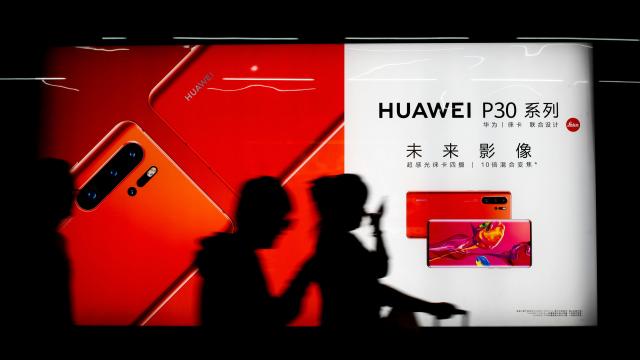Amid a U.S.-China trade war that, after brief signs of abatement, now seems headed off the rails and continued assertions by U.S. intelligence agencies that Chinese tech giant Huawei poses a national security risk, Donald Trump is poised to sign an executive order that could bar telecommunications companies from buying its equipment, Reuters reported on Tuesday.
Reuters cited “three U.S. officials familiar with the plan,” which would not name any specific nations or companies but instead give the president the authority to “regulate commerce in response to a national emergency that threatens the United States.”
That would be a clear shot at Huawei, which the U.S. intelligence community — largely without presenting hard evidence — has presented as a security risk due to its alleged ties to the Chinese military and intelligence agencies.
Reuters wrote:
The order, which will not name specific countries or companies, has been under consideration for more than a year but has repeatedly been delayed, the sources said, asking not to be named because the preparations remain confidential. It could be delayed again, they said.
The executive order would invoke the International Emergency Economic Powers Act, which gives the president the authority to regulate commerce in response to a national emergency that threatens the United States. The order will direct the Commerce Department, working with other government agencies, to draw up a plan for enforcement, the sources said.
Very much in keeping with this administration’s habit of arbitrarily declaring things national emergencies to seize more power! However, Reuters noted that reports have periodically indicated that the executive order was under consideration or imminent in May 2018, December 2018, and February 2019, so this could just be another false start.
Huawei is widely seen as having a significant advantage in the race to next-generation 5G technology, and it is now the world’s largest telecommunications equipment provider. In the U.S., Reuters wrote, Chinese companies like Huawei and ZTE have mostly had their footprints restricted to small, rural carriers looking for cheaper equipment.
According to a recent Times of London report, the CIA has told members of the “Five Eyes” intelligence alliance (Australia, Canada, New Zealand, the U.S., and the UK) that Huawei is bankrolled in part by the People’s Liberation Army, China’s National Security Commission, and another branch of the Chinese intelligence service.
The U.S. has also charged Huawei and a U.S. subsidiary with trade theft, obstruction of justice, and fraud, and it is seeking the extradition of its CFO Meng Wanzhou on accusations of financial fraud and violations of Western embargoes on Iran.
Beyond that, the U.S. intelligence community’s position seems to be that Huawei poses an inherent security risk because China’s Communist government could simply order it to spy on customers at any time. This has been accompanied by threats of varying subtlety that the U.S. could limit intelligence sharing with countries that build 5G networks with Huawei gear.
This argument has notably failed to win over some allies, such as Germany. A separate report in the Guardian indicated that Huawei is attempting to get the UK to bail from the U.S. position by signing a “no-spy agreement”, and a British government oversight report indicated that vulnerabilities identified in Huawei products were likely the result of “basic engineering competence and cyber security hygiene” rather than nefarious plotting.
Huawei has strongly and repeatedly denied that it engages in any espionage on behalf of the Chinese government — with rotating chairman Guo Ping telling media earlier this year that being caught doing so would be economic “suicide.”
Moreover, the push to crack down on Huawei falls in line with other moves by the U.S. government to punish Chinese companies, such as the Federal Communications Commission’s recent announcement that it would block mainland China’s largest telecommunications company, China Mobile, from entering the U.S. market.
(According to Reuters, the FCC has said it is mulling expanding that ban to China Unicom and China Telecom Corp.)
There is some suspicion, and not solely from Huawei, that the supposed security threat is not really supported by the evidence and is being driven by China hawks stateside.
On the other hand, Huawei has pointed out that the U.S. has also engaged in mass surveillance of its own and worldwide communications networks — a fair rejoinder but not exactly a reassuring one, given China’s own ambitions towards superpower.
In any case, Trump’s order could come this week or it could get delayed again, with uncertain impacts on the course of trade negotiations or future 5G deployment in the states. According to the Financial Times, there are rumours it could fall on Wednesday afternoon.
“Signing of the executive order will add yet another complication to the current trade tensions with Beijing and be used by those in Beijing’s leadership warning against signing a deal with the U.S.,” former CIA head of China analysis Dennis Wilder told FT,“because the attitudes of the Trump administration toward China are hardening to a point where a viable trade deal may not be possible.”
[Reuters]
